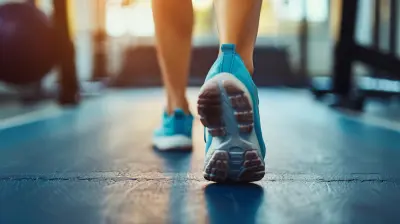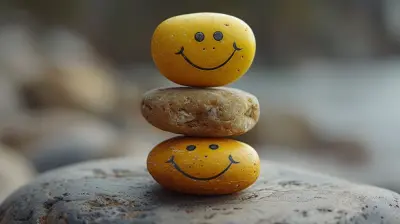How Empathy Helps with Addiction Recovery
25 July 2025
Addiction recovery is tough. Anyone who’s been through it or supported someone in recovery knows it's not just about quitting a substance or behavior — it's about rebuilding a life. And while we often talk about therapy, medication, and support groups, there’s one powerful force that often gets overlooked: empathy.
Yep, good old-fashioned understanding and human connection. That thing we all crave when we're at our lowest. But how exactly does empathy help with addiction recovery? Let’s dive deep.
What is Empathy, Really?
Before we unpack how empathy helps in recovery, let’s get on the same page about what empathy really is.Empathy isn’t just saying, “I feel bad for you.” That’s sympathy. Empathy goes deeper. It’s about stepping into someone else’s shoes — feeling what they feel, seeing the world through their eyes, and truly being there.
Think of it like this: If sympathy is sending someone an umbrella during a storm, empathy is sitting in the rain with them, no questions asked.
Why Addiction Recovery Hurts So Much
Recovery isn't just a physical battle — it's emotional, psychological, and spiritual. People in recovery often deal with:- Shame and guilt from past actions
- Isolation from friends or loved ones
- Self-doubt and fear of failing again
- Mental health struggles like anxiety or depression
Addiction itself often stems from pain — trauma, loneliness, or emotional wounds. So, when someone starts recovery, they’re not just putting down the bottle or the pill. They're confronting all the feelings they numbed for years. And that’s terrifying.
This is where empathy comes in. Big time.
Empathy vs. Judgment: A Life-Changing Difference
Let’s be honest — our first instinct isn’t always empathy. Especially when dealing with someone who’s hurt us during their addiction. Maybe they lied, stole, or pushed us away. It's easy to go, “They made their bed, now they have to lie in it.”But judgment can push someone further away. It reinforces their shame, makes them feel unworthy of connection, and can even trigger a relapse.
Empathy, on the other hand, says, “I see your pain, and I’m still here.” And that simple act of human connection can be the turning point in someone’s recovery journey.
The Science Behind Empathy in Recovery
Alright, let’s nerd out for a second. Science actually backs this up.Studies have shown that individuals in recovery who feel supported and understood are less likely to relapse. Why? Because empathy meets some of the deepest human needs:
- Connection: Feeling isolated is a huge relapse trigger. Empathy builds bonds.
- Validation: It tells the person, “Your pain is real, and it matters.”
- Motivation: When someone believes in us, we want to rise to the occasion.
Even brain scans show that empathetic interactions can activate oxytocin — the “love hormone” — which reduces stress and increases trust. Sounds like exactly what someone in recovery needs, right?
The Role of Empathy in Key Stages of Recovery
Let’s break it down even further and see how empathy supports different stages of the recovery process.1. Acknowledging the Problem
This is probably the hardest part — admitting there’s a problem. Denial is a self-protection mechanism, and empathy can gently break down that wall.Instead of confronting someone with anger or accusations, empathetic conversations like, “I’ve noticed you’re struggling. Are you okay? I’m here if you want to talk,” open the door to truth and healing.
2. Detox and Withdrawal
This stage is physically rough but also emotionally brutal. Anxiety, guilt, insomnia, even panic attacks. During detox, what someone really needs isn’t advice — it’s comfort.Holding space. Listening. A reassuring hand on the shoulder. These small acts of empathy offer peace during one of the stormiest parts of recovery.
3. Therapy and Inner Work
Here’s where the real emotional digging begins. Empathy from a therapist, sponsor, or support group can make someone feel safe enough to unpack years of trauma, fear, and self-hate.Without that safety net, people often shut down. They might go through the motions of therapy but never get to the root cause. Empathy keeps the door open.
4. Rebuilding Relationships
Addiction often damages relationships. Repairing them can be messy. But when both sides approach the process with empathy — understanding the pain on both ends — healing is possible.Think about it: if both people can say, “I see your hurt, and I want to move forward,” that's a powerful step toward reconciliation.
5. Long-Term Sobriety and Preventing Relapse
Recovery is never a one-and-done. Life will throw curveballs. Triggers will pop up. Old habits will whisper, “Just one drink. Just once.”Having empathetic people around — those who check in, who listen without judgment — can be the difference between staying clean and slipping back.
Sometimes all it takes is one heartfelt, “How are you really doing?” to bring someone back from the edge.
Empathy from Different Sources
Empathy doesn’t only come from therapists or loved ones. It can come from all directions. Let’s look at where it shows up:1. Family and Friends
If you’re supporting someone in recovery, your empathy matters more than you know. Show up, ask questions, be patient. You don’t have to fix everything — just be present.2. Support Groups
Ever wonder why 12-step programs like Alcoholics Anonymous work for so many people? Huge part of it is the empathy in the room. People who get it. Who’ve been there. No judgment.Shared empathy is one of the strongest glues in a recovery community.
3. Therapists and Counselors
Professional empathy isn’t about being nice — it’s about deep listening, holding space, and guiding someone through the darkest parts of themselves with compassion.4. Self-Empathy
Big one here. People in recovery have to learn to forgive themselves. To offer themselves the same kindness they’re so willing to give others.It’s not easy, but self-empathy can turn inner critics into inner allies.
Empathy Doesn’t Mean Enabling
Let’s clear something up: being empathetic doesn’t mean you ignore harmful behavior. It doesn’t mean you let someone walk all over you.Empathy sets boundaries with care. It says, “I love you, and I won’t support actions that hurt you or others.” That’s the balance — honest, loving accountability.
You can be kind without being a doormat. You can be understanding without excusing repeated harm.
How to Be More Empathetic Toward Someone in Recovery
Want to support someone better? Try these real-life empathy boosters:- Listen more, talk less: Sometimes the best thing you can say is “I hear you.”
- Ask open-ended questions: “How are you feeling today?” beats “Are you better now?”
- Avoid fixing: Don’t jump to solutions. Sit with them in the discomfort.
- Reflect feelings: Say, “That sounds incredibly hard. I can see why you feel overwhelmed.”
- Be patient: Recovery is a marathon, not a sprint. There will be setbacks.
Final Thoughts: Empathy is the Healing Thread
Addiction isolates. Empathy connects.It doesn’t solve everything overnight, but it lays the foundation for trust, growth, and healing. Whether you're in recovery yourself, supporting a loved one, or working in a professional role — don’t underestimate the impact of simply being human.
Our world is quick to judge and slow to understand. But in the quiet moments, when someone feels truly seen and heard? That’s where the magic happens. That's where recovery becomes real.
Let’s be the kind of people who sit in the rain with others. Because sometimes, just being there is all someone needs to see the light again.
all images in this post were generated using AI tools
Category:
EmpathyAuthor:

Alexandra Butler
Discussion
rate this article
2 comments
Theodora McAleer
Empathy truly is a powerful tool in addiction recovery! It builds connections, fosters understanding, and creates a supportive environment. The journey is tough, but we're in this together!
December 8, 2025 at 5:36 AM

Alexandra Butler
Absolutely! Empathy is essential for fostering connection and support in the recovery journey, making it more manageable and meaningful. We're all in this together!
Tracie McFee
This article beautifully highlights the crucial role empathy plays in addiction recovery. Understanding and connection foster healing, making the journey feel less isolating. Thank you for shedding light on such an important topic!
August 1, 2025 at 4:54 PM

Alexandra Butler
Thank you for your thoughtful comment! I'm glad you found the article resonant—empathy truly is a key element in the recovery journey.


